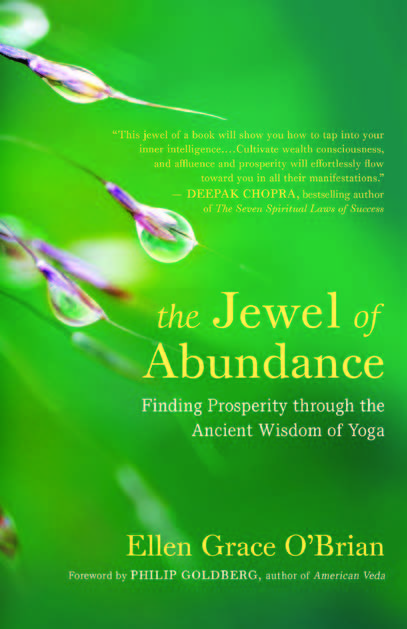We are born to thrive. If we look, we can see this — everything in nature, including us, is geared toward the growth and fulfillment of its purpose.
The sapling Red Delicious apple tree in the garden stretches toward the sun, and given the right conditions, it blossoms and bears sweet fruit. How we delight to witness that same impetus of blossoming growth in a baby! We applaud as she first lifts her head, then rocks on all fours and crawls forth to pursue adventure and taste the world. What next? She stands up, speaks, falls down, gets up, and runs off to school with the innate imperative to thrive that is her birthright.
The inclination to thrive, prosper, and fulfill our potential is the natural impulse of our divine capacity as spiritual beings. The same energy that gives birth to stars in the cosmos inspires music, literature, architecture, medicine, dance, technology — any and all forms of creative expression and manifestation. That energy is unlimited; it pervades all of nature, relentlessly encouraging all of life to realize its full potential: Thrive! it implores. It whispers in our dreams and stirs our imagination with its evolutionary call: Prosper! Live your full life; do what you came here to do. Follow the impulse to prosper and become all that you truly are in your fullness.
As a child, do you remember being asked, “What do you want to be when you grow up?” Even as a young girl in the 1950s and 1960s, when career options were more restricted for women, I thought about what I might do when I got older. I dreamed of who I might become. But like many young people even today, I didn’t have a context for my dreams. I was not aware of a structure other than cultural expectations that could illumine the path ahead. Over the years, I’ve heard many spiritual seekers share a similar story. They often say something like, “Wouldn’t it be great if life came with an instruction manual?”
That seemingly missing instruction manual can be found in ancient Vedic how-to-live teachings for seekers of all ages. One of the most important instructions we find there is what is called purushartha — the four universal goals of human life. This sublime and practical guidance is one of the precious jewels of Sanatana Dharma. Also known as the Eternal Way, Sanatana Dharma is the traditional name for the Vedic philosophical principles and spiritual practices that became known as Hinduism. Based on our individual connection to cosmic order, this comprehensive approach to spiritually conscious living is for all people and for all time.
The literal meaning of the Sanskrit term purushartha is “for the purpose of the soul.” That’s it! What we do in life — our dreams, our aims, our goals, and our accomplishments — are to serve the soul, to support our spiritual destiny.
Pursuit of the four aims of life contributes to living with balance, integrity, and joy. When rightly understood and used as a guidepost, the four goals help us develop on all levels. We become both spiritually aware and worldly wise.
The first goal is dharma, which encompasses realizing our higher purpose and fulfilling our destiny in this lifetime. The word dharma is rich with meaning: the way of righteousness, purpose, duty, support, law, or a goal of life. Dharma is the fundamental law of life, the underlying cosmic order. Literally, it means “what holds together.” Consider this “holding together” as the connection between divine order and our individual lives and destiny. Our lives are intertwined with the cosmic order. An intelligent, enlivening power is nurturing our universe and we can learn to cooperate with it. Each of us has a purpose, a place, a duty, and a divine destiny.
The overarching dharma or universal purpose of life is to awaken to our essential spiritual nature. Waking up spiritually is Self-realization and God-realization — realizing the truth of our being and having knowledge and direct insight into Ultimate Reality. When we wake up, we can live in harmony with divine order, actualize our innate potential, and make a positive contribution to life. Beyond all else we are inspired to do, it is this highest priority that promises lasting fulfillment. Dharma is our north star. But dharma does not shine alone — its brilliance is set off by the three other life goals that surround it.
The second goal, artha, or prosperity. The aim of artha is to prosper in every way — to develop the consciousness and the skills to attract whatever is needed to fulfill our dharma or higher purpose. In this context, prosperity is understood as a spiritual goal — not for its own sake, but for the sake of the soul. It provides the means to live fully and freely. When prosperity is equated with material wealth attained for its own sake, the word prosperity loses its deep meaning. True prosperity is experienced in a spiritual context. Because this truth is frequently missed, the words prosperity and wealth are often narrowly defined or understood at the level of material accomplishment alone. But as you work through these teachings, you’ll see that these words can rightly be applied and understood in the highest way as spiritual goals. And that makes all the difference.
The third goal is kama, which is pleasure or enjoyment. This, too, is for the sake of the soul. Our inclination to seek pleasure springs from the simple joy of being alive and is linked to our higher quest for ananda, the soul’s bliss. It doesn’t take that long to realize that playing with pleasure is playing with fire; pleasure and pain are linked. To effectively embrace pleasure as one of life’s essential goals without getting burned by it, we need to understand it. And we can. This requires discerning what enhances our joy and what depletes it. Ultimately, this life aim points us in the direction of the soul’s bliss, where our search for unending joy can be realized. Life is meant to be lived fully and enjoyed.
The fourth goal is moksha. Moksha is the absolute freedom that blossoms from enlightenment. It is the liberation of consciousness from the errors of perception that cause identification with our small, personal self. It is the realization of our true, divine Self that makes it possible to live spontaneously, freely, and joyfully in the world. The first three aims are oriented toward this one. Live with purpose. Prosper. Enjoy life. Set your sights on freedom. Living with higher purpose, doing what is ours to do, thriving, enjoying life — all are meant to point us in the direction of ultimate fulfillment and freedom. Jesus highlighted this so well with the question, “What does it profit us to gain the entire world if we lose our soul?” Or, as Paramahansa Yogananda encouraged, “Why not live in the highest way?”
Artha and kama, the goals to thrive and enjoy life, are supported, clarified, and constrained by dharma — purpose and duty — and moksha — the liberation of consciousness. Seen in this way, we live both a full and a balanced life. Too much spiritual striving, as if fulfillment is found at the end, neglects the aim of kama — to live joyfully now. Without the illumination of higher purpose, unbounded pursuit of either pleasure or wealth ultimately leads to a life of distraction and pain.
These four universal life goals offer a context for our life, the guiding light we yearn for. Our desire for a meaningful life is even greater than our desire for happiness. It’s universal. No matter what our culture, ethnicity, gender, religion, spiritual path, or the particular time we live in — we are here to awaken and fulfill our potential. It’s the soul’s journey from the darkness of ignorance to the light of Self-realization, from confusion about who we are and what our purpose is to clarity and self-actualization.
Once we recognize the primary dharmic goal to awaken, we can see that our life is perfectly arranged to support us in doing just that. Not only that, we discover lasting fulfillment along the way as conscious partners in a world awakening to its potential. From the dark ages to the technological advances of today, we are ready for the greatest evolutionary jump the world has ever known — the awakening of our hearts and our minds to the unity of all life. Awakening, prospering, and fulfilling our potential is inextricably tied to the well-being of all. What we do matters. We are powerful agents, not only of personal prosperity, but of essential social change and planetary healing, so that all may prosper.
How do we do it? We wake up. We realize who we are as spiritual beings in a spiritual universe, joyously and inescapably connected in the one divine Ultimate Reality expressing itself as all that is. We grow up. We free ourselves from the shackles of blame and welcome responsibility for our life. We mature beyond the adolescent egocentric level of consciousness that fosters greed, the disease at the root of both personal and planetary malaise. And we show up. We discover how to prosper — how to realize our potential and bring forth our profound offering to life.
Excerpted from the book The Jewel of Abundance: Finding Prosperity through the Ancient Wisdom of Yoga. ©2018 by Ellen Grace O’Brian. Printed with permission from New World Library — newworldlibrary.com.
 Ellen Grace O’Brian is the author of The Jewel of Abundance and director of the Center for Spiritual Enlightenment in San Jose, CA. Ellen is a yogacharya (an esteemed yoga teacher), a radio host, and an award-winning poet who weaves poetry into her teachings on spiritual matters, pointing to the mystical experience beyond words and thought. Ordained by a direct disciple of Paramahansa Yogananda, she has been teaching Kriya Yoga philosophy and practice nationally and internationally for over three decades. Visit her online at ellengraceobrian.com.
Ellen Grace O’Brian is the author of The Jewel of Abundance and director of the Center for Spiritual Enlightenment in San Jose, CA. Ellen is a yogacharya (an esteemed yoga teacher), a radio host, and an award-winning poet who weaves poetry into her teachings on spiritual matters, pointing to the mystical experience beyond words and thought. Ordained by a direct disciple of Paramahansa Yogananda, she has been teaching Kriya Yoga philosophy and practice nationally and internationally for over three decades. Visit her online at ellengraceobrian.com.




















